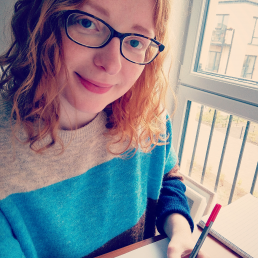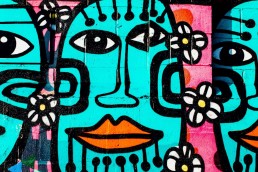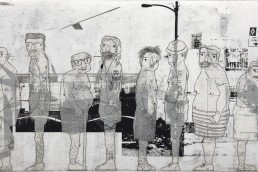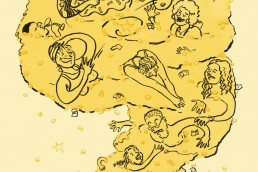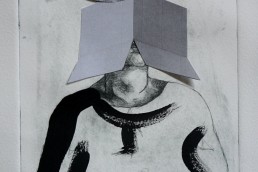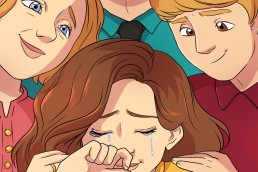By Julie Farrell
Photography by Elizabeth Lies, via Unsplash
For me, three days on the trot, in the office from 9-5, was a colossal effort to get through. It could be done and done well — but the headache, the pains in the joints, the fatigue all started to sneak in on day two and by the end of day three I would feel like I’d been hit by a truck. We’re talking all-over-body pain and crushing fatigue; I would further exhaust myself by attempting to hide this.
An early night was essential (though often not possible if working at an event) and the sleep lasted until late morning, when time allowed. If I couldn’t sleep-in, it was a day of complete cognitive shut-down. On the worst days, sleep wouldn’t make any difference and the day was a total write-off. Work was impossible (and if forced would likely set alarm-bells ringing amongst colleagues, or assumptions would be made.) If I was lucky by evening I’d be starting to feel a little more awake and energetic, but it would be likely that my husband would be on dinner duty, and massage therapist duty, until bedtime. When a run of working days fell just before the weekend, I inevitably spent it recovering at home.
That’s just one example of the ways I was affected — and how different working patterns meant different health-management patterns. Because that’s what being chronically ill is — a constant cycle of exertion and recovery, always. Interestingly, on return from three weeks of travelling the US for our honeymoon, we were stunned into silence when we realised that I had lived three whole weeks on the trot with no ill-health beyond a little tiredness. I think we realised neither of us had brought it up on the trip because we were subconsciously afraid of somehow jinxing this marvellous, foreign thing.
I have only worked part-time since I graduated ten years ago. That makes a career an incredibly difficult thing to establish. Progression is sadly out of reach for many of the chronically ill. Luckily for me, those ten years, with the support of my husband (and a ton of determination), allowed me to establish myself as a ‘successful’ freelancer, for a time. From the outside looking in; I worked hard, I was passionate, and I had the leisure of picking and choosing what projects I took on. But on the inside; I was suffering on the days in between in order to balance work, whilst my full-time peers were flourishing at manager or senior level in their careers, with pay packages to match. I wasn’t ungrateful and in fact I’m one of the lucky ones — I easily made it look like choice. But it’s incredibly sad that I had to do that to be respected in my working environment, to be seen as a success. Usually, as soon as it was revealed that my freelancing part-time was down to my health, people were sympathetic, but ultimately if you can’t work to their parameters they just don’t want to know. Being ill is very much an inconvenience to employers and is quickly bundled into the ‘inflexibility’ category on the part of the sufferer. We go from a respected and admired colleague to a liability in the blink of an eye. What, we have to ask, has actually changed? Nothing. Only their perception of us.
I kept my health to myself unless absolutely necessary. Why? We live in an age that claims to want to smash stigma, support workers and provide flexible working solutions. But we need to put our money where our mouths are and let go of the 9-5 model.
“We live in an age that claims to want to smash stigma, support workers and provide flexible working solutions. But we need to put our money where our mouths are and let go of the 9-5 model.”
When an opportunity arose to work full-time for an organisation I loved, and at the encouragement of my boss, I decided to go for it — throwing caution to the wind, for once. Those who knew about my health said it was a bad idea. It took a sixty-hour week running a big event to make me really appreciate my chronic illnesses — and that I simply didn’t have the luxury of throwing caution to the wind. I pushed myself to the edge, through extreme pain and fatigue and suffered the consequences. Days of recovery ensued. I went back and explained that my health just would not allow me to commit to working full-time. And just like that, I was out of the game. I felt so guilty, I had let them — and myself — down.
This is of course, not the case at all. But speak to any person living with a chronic condition trying to make the best of it, and you will hear the same story. We repeatedly push ourselves to the edge in order to succeed. There is a shocking lack of understanding of chronic conditions and how they require a huge amount of management, often solely in the sufferers own hands. Management requires time – and money. I paid a half, if not more, of my earnings to managing my condition: with yoga, massage, physical therapy, and travel. Big surprise — relaxation and time to discover new things are invaluable in managing ill health. My honeymoon was evidence that being free of the stresses and pressures of life meant I was not ill in that time. Does that mean I am not chronically ill? Maybe it does, and that’s an interesting concept — but society makes me choose one or the other, it won’t let me have both – because our circumstances and environments are just not part of the labels and boxes of our society. My government tells me I am not ill enough. I lose days, weeks, months, to my illnesses, and yet I am deemed as not sick enough to receive financial support, through a humiliating and ruthless point-scoring assessment. I feel I am failing at being a productive citizen and I am failing at being ill.
“There is a shocking lack of understanding of chronic conditions and how they require a huge amount of management, often solely in the sufferers own hands. Management requires time – and money.”
The truth of it is: in daily life, I am ill. I have to accept that and deal with it. Too often, as soon as we find a moment of respite, we start to convince ourselves that we are getting better. You do too. And that has to change. In reality, it’s just a fleeting shaft of light against the shadow of living with chronic illness. And we shouldn’t have to hide it. Success comes in many forms, and I am no failure.
Julie Farrell
Julie is a disabled writer living in Edinburgh in the UK. She writes creative non-fiction with a mental health and disability slant, and she is in the beta stage with her first novel, Fractal: an own-voice, contemporary YA; about love, mental illness and self-discovery. She was selected as a runner-up for the Jericho-Marjacq Bursary for under-represented voices; and has been awarded a sponsorship for the Breakthrough Writers Bootcamp, for her novel. Julie worked as a marketing executive in the publishing industry, before deciding to focus solely on her writing. She has been published in various magazines and you can find more of her writing here. You can also find her on Twitter @weeredwriter.

